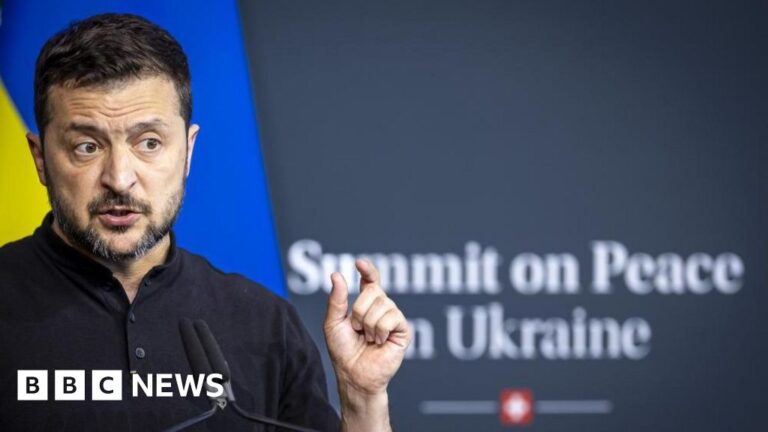- author, Sarah Rainsford
- role, Eastern Europe Correspondent
- Reported by Burgenstock, Switzerland
For two days, the sound of whirring propellers shattered the peace on the Swiss mountainside, but it was all for the good of peace in Ukraine.
The helicopters were ferrying world leaders and delegations to a summit convened to chart a path to end Russia’s war against its neighbor.
As Volodymyr Zelensky put it, this was an opportunity for Kiev to counter full-scale aggression with full-scale diplomacy and garner the broadest possible support for a Ukrainian peace plan.
Ultimately, the idea is that if the plan is presented to Russia and there is international consensus behind it, Moscow will have no choice but to accept it.
But even if that is possible, it still seems very far away.
On the eve of the summit, President Vladimir Putin made it clear that he had no intention of withdrawing troops, and at the time his own “peace proposal” called for Ukraine to surrender.
The Moscow influence was also clearly felt here in Burgenstock.
Of the roughly 90 countries that attended, only 84 signed the final statement affirming Ukraine’s territorial integrity and right to non-aggression.
Among the countries that abstained were Saudi Arabia, India and South Africa.
More significantly, China, a close ally of Russia, did not attend the entire summit, despite having been involved in earlier preparations; Russia itself was not invited.
But Zelensky and his team seem unfazed, even emboldened, by the outcome: Things could have been better for Kiev, but they could have been worse.
The president did not answer questions about which countries signed the statement, saying those who did not sign it now could do so in the future, and suggested this weekend that some countries were only represented at a low level and that talks needed to take place in their capitals.
The summit comes at a time of grave danger for Ukraine on the battlefield.
The country’s military is under pressure from a new Russian offensive around Kharkiv in the northeast.
And the military aid from the West that Ukraine is counting on to resist Russia continues to arrive frustratingly slowly.
“Is winning enough? No. Is it too late? Yes,” Zelensky told reporters at the end of the summit.
But he said he seeks and gets more every day.
It therefore makes sense to take the lead on the peace proposal and try to shape the process.
With U.S. presidential elections due later this year and a surge in voting in Europe for far-right parties that tend to be sympathetic to Russia, support for Ukraine could wane in the coming months.
The country itself was exhausted by more than two years of war, the lines at military graves in cemeteries across the country were getting longer, and volunteers were no longer flocking to enlistment offices in large numbers.
That doesn’t mean Kiev has given up the fight.
“We are talking about peace not because we are weak,” President Zelenskyy replied firmly when I pressed him.
“We have always wanted peace. When the war was at its peak, we were still talking about peace. We wanted the world to pressure Russia to end this war, and stop killing us, and stop killing civilians.”
The three least contentious areas at the summit were protecting food exports, ensuring the security of Ukraine’s nuclear facilities and accelerating the return of prisoners and children forcibly deported from occupied territories.
“The return of the prisoners is a top priority for us because we know how much our people are suffering in captivity at the hands of Russian troops,” explained Maxim Kolesnikov, who was held captive for 11 months after the unit was captured in early 2022.
He said he was beaten daily in Russia, and that most of the other prisoners in his cell were civilians.
But like President Volodymyr Zelenskiy, he stressed that talking about peace does not mean surrender.
“I went to war for the first time when I was 37 and the second time when I was 45. Now I’m 57 and I don’t want to go to war again,” the soldier said on the sidelines of the summit.
“We want a robust peace where our independence and territorial integrity are ensured.”
Away from this hushed environment, a working group will be set up to continue the Burgenstock talks, but it is not really clear how this will translate into the peace plan envisaged by Ukraine and its Swiss hosts.
Both countries have said that a second summit, which Ukraine has suggested could be hosted by Saudi Arabia, could in principle also involve Russia – something Switzerland would like to encourage.
But President Vladimir Putin has shown no signs of being serious about pursuing peace.
The weekend summit ended somewhat abruptly, several hours earlier than expected.
It was not a complete success for Ukraine.
But this was an opportunity for President Zelensky to drive home his main message: that Russia, like a school bully, only responds to force.
Whether it be on the battlefield or in diplomacy.

